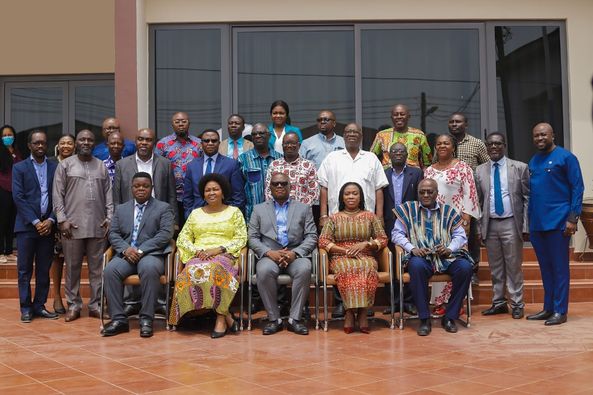On the theme “Impact of the Domestic Debt Exchange Programme on the Private Sector of Ghana,” the Ghana National Chamber of Commerce and Industry (GNCCI) successfully held the inaugural edition of its Chamber National Dialogue Series.
The dialogue series aimed to address the effects of the Domestic Debt Exchange Programme (DDEP) on the private sector and explore necessary business strategies and policy adjustments to mitigate losses. The event attracted industry experts, academics, policymakers, and business people who shared their knowledge, experience, and insights towards developing policy briefs.
The maiden, who, Mr. Senyo Hosi, and Dr. Richmond Akwasi Atuahene, who provided their perspectives on the DDEP and proposed solutions for the future. The program comprised four main parts: Opening, Topical Presentation & Engagement, Experiential Session & Engagement, and Closing.
In his opening remarks, the President of the GNCCI, Mr. Clement Osei-Amoako, expressed concerns over the state of the Ghanaian economy and emphasized the need for practical measures to address structural and cyclical challenges such as high inflation, rising interest rates, cedi depreciation, increasing debt levels, and a tightening policy rate. He highlighted the importance of balancing the inherent losses of the DDEP and making corresponding adjustments in fiscal and monetary policies.
Prof. Peter Quartey, the Director of the Institute of Statistical, Social and Economic Research (ISSER) at the University of Ghana, spoke on the impact of the Domestic Debt Exchange Programme on the private sector of Ghana and the requisite adjustments. He discussed the potential risks and opportunities for businesses in the country and the implications of the DDEP on the quest for industrialization and Ghana beyond Aid agenda. He called for radical measures to address the challenges of the Ghanaian economy in light of the DDEP.
Mr. Senyo Hosi, the convener of the Ghana Individual Bondholders Forum, provided valuable insights into the perspective of individual bondholders regarding the DDEP and mitigated measures. He addressed key questions such as how the government has engaged individual stakeholders on the DDEP and what the expected impact of the DDEP will be on individual bondholders and their mindset towards government bonds. He stressed the need for transparency and effective communication from the government to individual bondholders and measures to protect their interests.
Dr. Richmond Akwasi Atuahene, a banking consultant, presented on the topic of the DDEP-contagion on the financial sector and mitigating measures. He explored alternatives to complement or replace the current approach to mitigate the impact of the DDEP on the financial sector and financial stability. He suggested the development of a well-functioning secondary market for government securities and improved communication and engagement with stakeholders in the financial sector to mitigate any negative effects.
In his closing statement, Mr. Osei-Aoako acknowledged the significance of the DDEP in reinstating macroeconomic stability and safeguarding the most vulnerable segments of society. He stressed the need for businesses to comprehend the implications of the policy and devise suitable business strategies.






